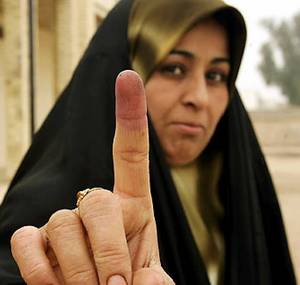al-Qaeda Has Lost the Battle for Iraq

To those who think the Iraq War is creating more terrorists in Iraq than it is killing --- and many of the same people seem to worship public opinion polls -- Read 'em and weep.
via Judith Klinghoffer
Overall 94 percent have an unfavorable view of al Qaeda, with 82 percent expressing a very unfavorable view. Of all organizations and individuals assessed in this poll, it received the most negative ratings. The Shias and Kurds show similarly intense levels of opposition, with 95 percent and 93 percent respectively saying they have very unfavorable views. The Sunnis are also quite negative, but with less intensity. Seventy-seven percent express an unfavorable view, but only 38 percent are very unfavorable. Twenty-three percent express a favorable view (5% very).
Views of Osama bin Laden are only slightly less negative. Overall 93 percent have an unfavorable view, with 77 percent very unfavorable. Very unfavorable views are expressed by 87 percent of Kurds and 94 percent of Shias. Here again, the Sunnis are negative, but less unequivocally—71 percent have an unfavorable view (23% very), and 29 percent a favorable view (3% very).
Overall 94 percent have an unfavorable view of al Qaeda, with 82 percent expressing a very unfavorable view. Of all organizations and individuals assessed in this poll, it received the most negative ratings. The Shias and Kurds show similarly intense levels of opposition, with 95 percent and 93 percent respectively saying they have very unfavorable views. The Sunnis are also quite negative, but with less intensity. Seventy-seven percent express an unfavorable view, but only 38 percent are very unfavorable. Twenty-three percent express a favorable view (5% very).
Views of Osama bin Laden are only slightly less negative. Overall 93 percent have an unfavorable view, with 77 percent very unfavorable. Very unfavorable views are expressed by 87 percent of Kurds and 94 percent of Shias. Here again, the Sunnis are negative, but less unequivocally—71 percent have an unfavorable view (23% very), and 29 percent a favorable view (3% very).
Iraqi confidence in Iraqi forces (as opposed to militias) is increasing while its confidence in US forces is decreasing. Given US policies there can be little doubt but that US forces have lost significant Shia support and gained some Sunni support. I suspect increasing number of Shia no longer believe that American forces are capable of protecting them and with increased confidence in their government's capabilities no longer fear the consequences of an American withdrawal.
It should be noted that Ayatolla Sistani retains his overwhelming popularity amongst the Shia. 95% approve of him. PM Maliki is running a strong second with 86% but al Sadr is trailing far behind with 51%. Nor are Iraqis interested in following Iran's lead.
Asked whether Iran is having a mostly positive or negative influence on the situation in Iraq, just 45 percent of Shias say it is having a positive influence (negative 28%, neutral 27%), while Iran’s influence is viewed a mostly negative by the Kurds (79%) and the Sunnis (94%).
President Mahmoud Ahmadinejad does a bit better among Shias, with 64 percent having a very (28%) or somewhat (36%) favorable view. But Kurds have a largely unfavorable view (very 43%, somewhat 34%) and the Sunnis an exceedingly unfavorable view (very 80%, somewhat 17%).
Syria is fairing even worse:
Most Shias (68%) think Syria is having a negative influence on Iraq’s situation, as do most Kurds (63%). Sunnis are only mildly positive, with 41 percent having a favorable view (17% negative, 43% neutral).
The most worrisome is the popularity of Hezbollah though luckily it is confined to the Shia.
Hezbollah elicits highly polarized views. An overwhelming 91 percent of Shias have a very (50%) or somewhat favorable (41%) view of Hezbollah, while an equally large 93 percent of Kurds have a very (64%) or somewhat (29%) unfavorable view. Sunnis are also fairly negative, with 59 percent having a very (10%) or somewhat (49%) unfavorable view.
This last part about the rising popularity of Hezb'allah is not exactly good news, but neither is it surprising. Olmert can shoulder much of the blame, for not beating them decisively. That would have meant "civilian" casualities -- in quotes because none of them wear uniforms -- and he just didn't have the stomach for it.
The postmodern west has lost its ability to be ruthless. But nature abhors a vacuum, and the jihadis are more than willing to fill this one with blood.

0 Comments:
Post a Comment
<< Home